QUICK FACTS for
prospective UNDERGRADUATE STUDENTS

WHAT DOES A MATERIALS SCIENTIST/MATERIALS ENGINEER DO?
We develop new materials with the properties and characteristics needed for specific applications. Examples include strong and lightweight materials for aerospace, biocompatible materials for medical implants, high-performance materials for electronic devices, and biodegradable materials for sustainability. We also study the behavior of materials under stress, heat, and other environmental factors to understand how they can be used, how they fail, and how they can be improved.
WHERE DO WE WORK?
Materials scientists and engineers work wherever technology, manufacturing, healthcare, and education employers are located. These opportunities are available in every state and worldwide.
Of our sixty-one 2021 and 2022 graduates, more than 66% are working as MSE professionals and more than 20% are now in graduate school. Those working in industry are employed by Carrier, Collins Aerospace, Corrosion Probe, Cyient, EWI, Fuel Cell Energy, General Dynamics Electric Boat, Hartz, Hazelett, Henkel, Honda, Keystone Industries, Markforged, Marmon, Medline, Paragon Medical, Polymer Resources, Pratt & Whitney, Response Technologies, Schaeffler Aerospace, Tiffany, Times Microwave Systems, Trumpf, Unilever, and US Space Force.

WHAT IS MATERIALS SCIENCE?
Materials science and engineering is an interdisciplinary field that studies the structure, properties, and performance of materials such as metals, ceramics, polymers, semiconductors, biomaterials, nanomaterials, composites, and more. It combines principles from chemistry, physics, and various engineering disciplines to understand how materials form, how they behave under real-world conditions, and how they can be used to create new technologies and products.
WHAT JOB TITLES DO WE HOLD?
Common job titles include: materials scientist, research scientist, product development engineer, product design engineer, materials engineer, quality control engineer, process engineer, metallurgist, semiconductor engineer, polymer scientist, composites engineer, materials testing engineer, welding engineer, cold spray engineer, and failure analysis engineer/scientist.
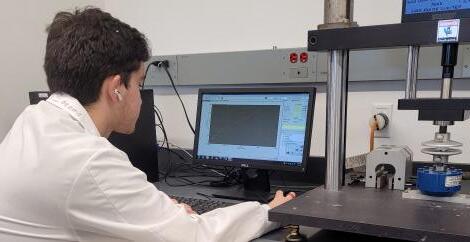
WHAT SALARIES ARE COMMON?
The median annual income for a materials scientist with a bachelor’s degree is $72,000. This increases to $90,000 for a master’s degree and $106,000 for a doctorate. (Zippia)

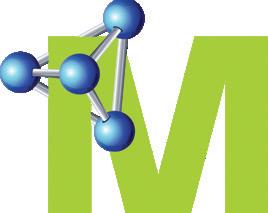
TOP REASONS OUR CURRENT STUDENTS CHOSE MATERIALS
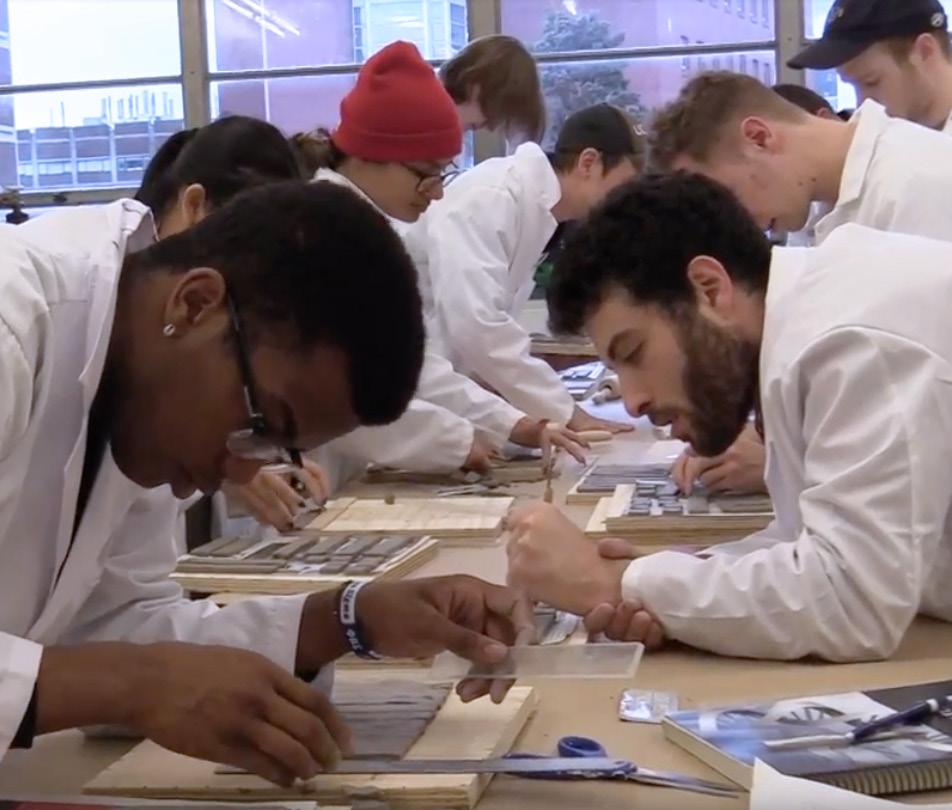
SMALL CLASS SIZE!
Our students know all their classmates as there are only 30-40 MSE students per academic year. A variety of professional and technical elective classes are offered to juniors and seniors. This results in collaborations across academic years and expands a students’ peer network. MSE students also form study groups to help each other.
MSE undergraduates are automatically members of the UConn Materials Advantage Club (UCMA). Club activities include educational outreach, professional development, and social activities. UCMA is linked to four professional societies which brings opportunities for scholarships, professional networking, and conference attendance. MSE students are also very active in the 3D Print, Metal Working, and Concrete Canoe clubs.
LOTS OF OPPORTUNITY FOR HANDS-ON EXPERIENCE WHICH HAS A HUGE IMPACT ON EMPLOYABILITY!
All MSE students are required to take three laboratory courses plus capstone design. MSE has the most hands-on instruction across the entire School of Engineering. MSE moved into the new Science One building in January 2023, so it also has the newest teaching lab space on campus.
All our lab classes are very hands-on with high studentinstrument contact. This better prepares our students for meaningful summer internships, research in faculty labs, and future careers.
Lab classes focus on processing equipment and characterization instrumentation common in the materials field. This includes heat treating and cold working of metals, firing of ceramics and extrusion of polymer; grinding and polishing stations for metallographic sample prep; universal testing frames for mechanical testing; spectroscopy, calorimetry and gravimetric analysis for polymer analysis; light and electron microscopy for imaging on the macro and micro scale, and much more. Each lab module emphasizes a different materials class such as metals and alloys, ceramics, polymers, and composites. Lab classes conclude with a
junior design module in which student teams use lab skills learned to investigate a materials phenomenon of their own choosing. Results are presented at an end-ofsemester poster session.
Our students also take a one-semester course on materials and system modelling. Students learn how to use the finite-element package ANSYS, which is widely employed in industry, to model structural requirements, heat transfer, acoustic and electromagnetic phenomena.
Finally, senior capstone design is a two-semester project in which student teams tackle a materials problem of importance to a company. Teams work with both industry and faculty mentors to define the problem scope, then utilize resources at UConn, the sponsor company and beyond to design and conduct their research. Results are documented as a final report and presentation, then displayed as a poster at the School of Engineering Demo Day Event in Gampel Pavilion. This large and very popular end of April event is open to alumni, industry, students’ families, and the general public.
SCIENCE AND ENGINEERING OVER ANOTHER ENGINEERING FIELD
AND EVEN MORE OPPORTUNITY FOR HANDS-ON EXPERIENCE!
Many MSE students join a materials research group as a student researcher. Although initially done for credit, this often transitions into a paid position. Student researchers prepare and test samples, analyze data, and participate in group meetings. Their work is mentored by faculty, postdocs, and graduate students. To initiate this, our students choose a research area of high interest to them then contact faculty working in this area. UConn’s Institute of Materials Science has over one hundred faculty working with a wide variety of material types and materials applications. There are a lot of great options to choose from.
MSE students are also strongly encouraged to apply for summer industry internships and summer Research Experiences for Undergraduates (REUs). Both are paid opportunities and an excellent way to explore different career paths, companies and institutions. They also increase future employability. Some students choose opportunities close to home while others opt to cast a broader net so they can travel and explore.

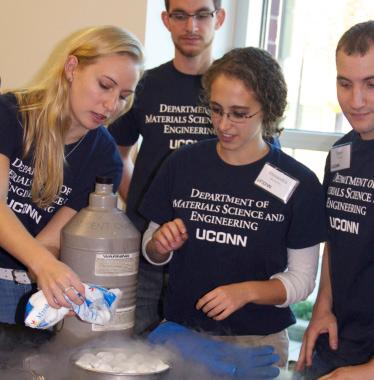
GRADUATION WITHIN 4 YEARS!
Most of our students declare the MSE major in their freshman or sophomore year. The curriculum is designed for these students to graduate in four years. We are also frequently approached by juniors who request transfer into MSE once they discover all we have to offer, and students who want to double major in MSE and another field. These students may require an additional semester or two.

MSE SCHOLARSHIPS ARE AVAILABLE!
Beyond financial aid and School of Engineering specific scholarships, we offer $80,000 in scholarships annually to our MSE undergraduates thanks to an endowment from devoted UConn MSE alumni. These funds reward multiple areas of excellence and engagement among our students. We also sponsor 5-10 undergraduates annually for paid lab research.
QUICK FACTS
for prospective UNDERGRADUATE STUDENTS
TOP REASONS

our current students chose Materials Science and Engineering over another engineering field
HUGE VARIETY OF EMPLOYMENT POSSIBILITIES ARE OPEN TO US!
Materials scientists and engineers can find work in all sorts of industries, from high tech (computer chips, nanomaterials, renewable energy, aerospace, defense, additive manufacturing, etc.) to common products we all use every day (personal care, medical devices and equipment, water filtration, clothing, sporting goods, food, toys, autos, etc.), to the more unusual (preserving and conserving historic artifacts and artwork, analyzing evidence in criminal investigations, developing methods to 3D print structures on the moon from lunar regolith, and so many others).
FEATURES ABOUT OUR UNDERGRADUATE STUDENTS

MSE senior discusses how she made the decision to study materials science and engineering over mechanical engineering at UConn.
Ever imagined what a day working at NASA would be like? One MSE senior had the opportunity to do just that.


An undergraduate student in materials science and engineering chose to attend UConn because of MSE’s undergraduate research opportunities.
A senior studies materials science and engineering after switching from chemical engineering in her freshman year.


DO WE HAVE TO GO TO GRADUATE SCHOOL TO HAVE A SUCCESSFUL CAREER?
Absolutely not. According to Zippia, 59% of all materials scientists/engineering stop at a bachelor’s degree. If you do choose to pursue an advanced degree in MSE, companies often pay for continuing education leading to a specialized certificate or a course-work focused master’s degree.
Research based master’s and PhD students nearly always earn a salary. Coming back as a full-time student also triggers suspension of student loan payments. Current students in the UConn MSE doctoral program earn an annual salary of $30,000 (1st year). This increases to $40,000 in their final year of the 4-5 year program. They also receive full tuition coverage plus health and other benefits such as funding to attend conferences.
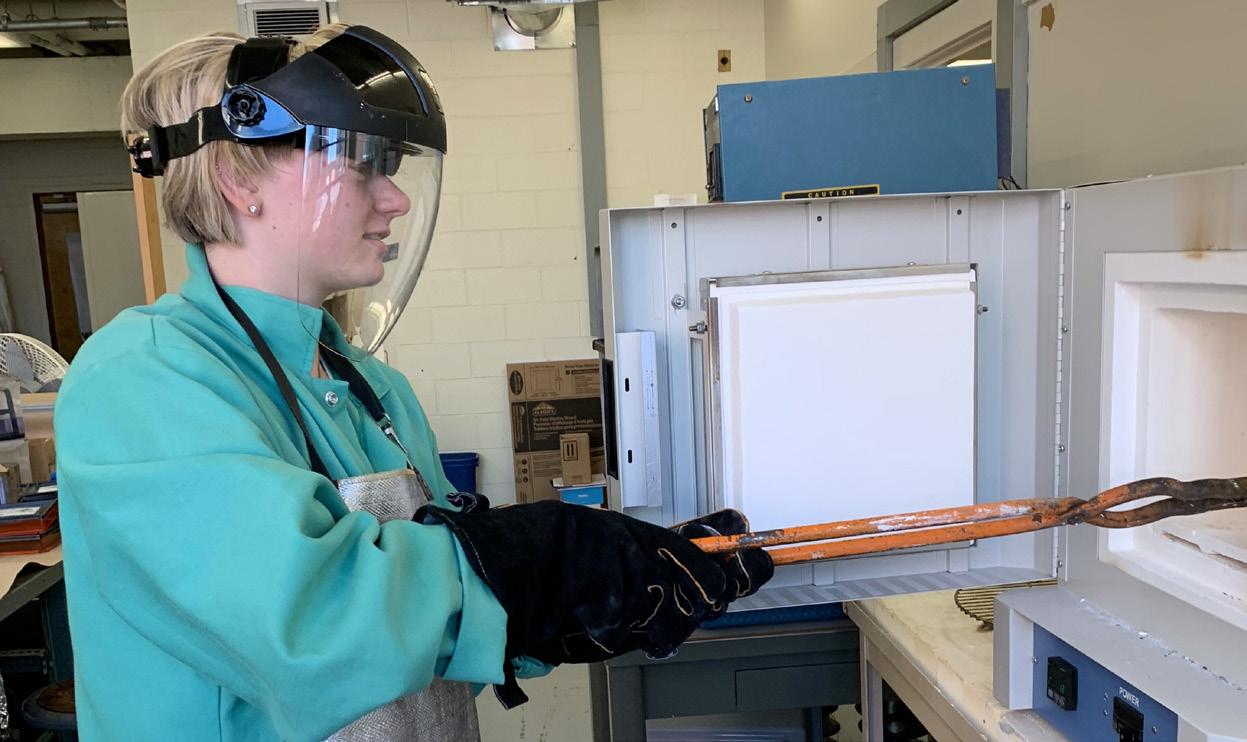
mse.engr.uconn.edu

25 King Hill Road, Unit 3136 Storrs, CT 06269-3136 Department of MATERIALS SCIENCE AND ENGINEERING 2023-03-27/HB















